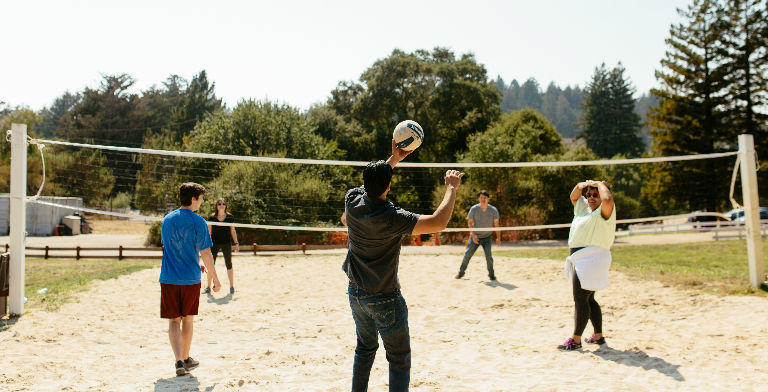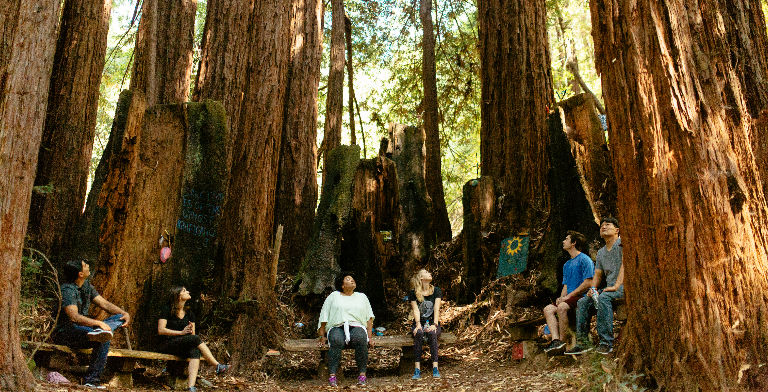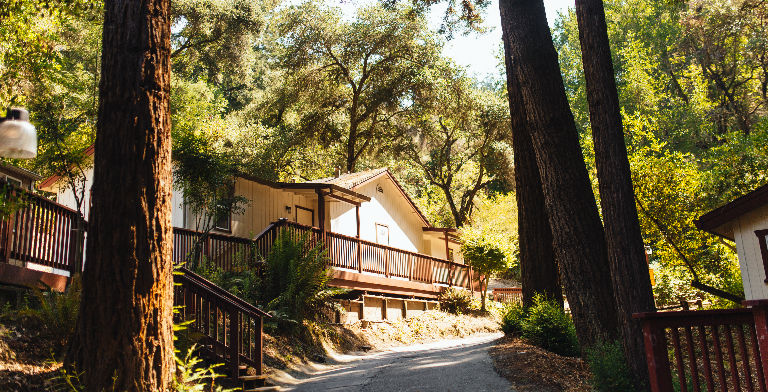The Camp Recovery Center helps individuals struggling with alcohol addiction find long-term recovery. Located near Scotts Valley & San Jose, CA, The Camp provides premier alcohol abuse rehabilitation.
Alcohol Abuse Rehab
Alcohol Abuse Rehab Near Santa Cruz & San Jose
Alcohol is the most commonly abused drug in the United States, and addiction to alcohol is the nation’s most common form of chemical dependency. Millions of people, including adolescents and adults, struggle with alcohol addiction, a disease that continues to have a staggering impact on individuals, families, and communities throughout the nation.
The Camp Recovery Center, located near Santa Cruz & San Jose, CA, understands what it means to be trapped in the downward spiral of alcoholism. For this reason, we have developed highly effective treatment methods to help people make the necessary changes that will allow them to achieve long-term sobriety from alcohol.
Helping a Loved One
Helping a Loved One or Family Member Enter Alcohol Abuse Rehab
If someone in your life is struggling with this disease, then you are well aware of the damage that an alcohol addiction can inflict upon an individual, and on those who care about him or her. What you may not realize, though, is that you are not helpless in this situation. The following are some of the steps that you and/or other friends and family members can take to help your loved one finally get the treatment that he or she so desperately needs:
- Educate yourself about what it truly means to be suffering from an alcohol addiction, including the signs, symptoms, and effects of alcohol addiction. Chronic alcohol abuse is not a character flaw or a sign of moral weakness. It is a progressive disease that, if left untreated, will continue to harm your loved one’s health and well-being. The more you learn about this disorder, the better you will be prepared to be a source of effective support.
- Learn about treatment. Individuals who have become dependent upon alcohol have a wide range of options when it comes to getting help. There is no such thing as a perfect rehab center or treatment program; instead, what is most important is identifying that is best suited program that will meet your loved one’s unique needs.
- Prepare yourself to talk to your loved one. Your goal is not to stage a dramatic confrontation, but to express your concerns and help your loved one understand that he or she needs professional help. Talk to experts or conduct your own research to learn how to have a productive conversation about receiving alcohol addiction care at a rehab center.
- Do not neglect your own needs. To be the best source of support for your loved one, you need to ensure that your physical and mental health needs are also being met. Mental health professionals and alcohol addiction experts can provide essential information and support to you and others whose lives have been affected by your loved one’s alcoholism.
The most important thing you can do for your loved one is to continue to be a source of love and support before, during, and after he or she is in treatment. From making initial appointments to attending family therapy sessions to being part of a long-term support network, your active presence can make all the difference in your loved one’s world.
Why Consider Us?
Why Those Near Santa Cruz & San Jose Should Consider Alcohol Abuse Treatment at The Camp Recovery Center
It is almost impossible to overstate the devastation that can result from an untreated alcohol addiction. Chronic alcohol abuse has been associated with catastrophic physical damage, including anemia, malnutrition, cirrhosis of the liver, pancreatitis, increased risk of certain cancers, and death. In addition to also undermining a person’s mental health and emotional stability, the continued abuse of alcohol can lead to destroyed relationships, unemployment, financial ruin, legal problems, homelessness, and suicide. Yet none of these outcomes are inevitable. There exists effective rehab centers that can provide a road map that can guide afflicted individual out of the darkness of their alcohol addiction and into the bright light of lifelong recovery.
Types of Treatment
Types of Alcohol Abuse Treatment Offered at The Camp Recovery Center
Nestled in the foothills of the majestic Santa Cruz Mountains, The Camp Recovery Center is a rehab center full of hope and healing. At The Camp, clinically sophisticated treatment is provided in a serene and secure environment.
For more than 30 years, The Camp has remained dedicated to providing the highest quality of life-changing care to adults who are struggling with alcoholism and other forms of chemical dependency. Individuals who choose to heal with us have the opportunity to work with talented and experienced nurses, addiction counselors, family therapists, and other professionals whose clinical expertise is surpassed only by their commitment and compassion.
Rehab at The Camp is a highly personalized experience, with each resident following a plan that has been customized to ensure that we are providing the type and level of care that best meets his or her unique needs. The following are among the many elements that may be included in a resident’s treatment plan at The Camp:
Detoxification: For individuals who have been unable to rid their bodies of alcohol or other drugs prior to arriving at The Camp, detoxification can be an essential precursor to full participation in treatment. When a resident is determined to be in need of alcohol detox services, we will coordinate with a doctor off of our center’s campus, who will develop and approve an appropriate detox protocol. As is the case with all aspects of treatment at The Camp, detox protocols are developed and implemented in the manner that best meets the specific needs of each resident.
Medication management: Residents whose alcohol addiction is accompanied by a co-occurring mental health condition may receive a referral to meet with a psychiatrist to determine if prescribed medication should be incorporated into their rehabilitation. Residents who receive medications will meet with the psychiatrist on a weekly basis to monitor their progress and adjust their prescriptions if necessary. Members of the nursing staff at our center also assist in monitoring residents’ medications.
Individual therapy: Residents and their case managers meet two times each week for individual therapy sessions. These sessions allow residents to process their experiences, discuss their progress, and address any concerns have arisen since the previous session.
Group therapy: Group therapy is an essential part of treatment for alcohol use disorder at The Camp. A variety of groups are scheduled every day, including weekends. Process groups are conducted five days a week. The following are examples of specific groups that may be conducted during a resident’s rehabilitation at The Camp:
- Activity Group
- CBT Groups
- Detox Groups
- Experiential Group
- Focus Groups
- Music / Poetry Groups
- Men’s Group
- Women’s Group
The following are a few examples of the many topics that may be addressed in group therapy sessions at The Camp:
- Self-helping thinking
- 12-Step Recovery
- SMART Recovery
- Relapse prevention
Family therapy: Residents and family members have the opportunity to participate in family therapy sessions twice each month. These sessions, which are led by marriage and family therapists, are designed to facilitate healthy communication among family members, address negative feelings and emotions that alcohol addiction causes, and promote the healing and strengthening of the family unit.
Experiential therapy: A variety of experiential therapies, including games, are scheduled every week at The Camp. Residents receiving treatment for alcohol addiction also have the opportunity to spend time in our gym six days a week. Additional experiential therapies at The Camp include the following:
- Acupuncture
- Meditation
- Yoga
Community meetings: Resident-run community meetings are held every morning, including both weekdays and on the weekends. These meetings, which are a major component of the therapeutic process at The Camp, provide an opportunity for residents to review the agenda for the day, do readings, and address any issues that are relevant to the group. In addition to being sources of important information, community groups promote healthy independence and interdependence while also facilitating the forming of productive sober relationships that can be essential to supporting long-term recovery from alcoholism.
At The Camp Recovery Center, we know that residential treatment is just one step on the path of lifelong recovery from an alcohol addiction. To ensure that every individual who completes treatment with us is best prepared for the next phase of their recovery, our case managers work closely with all residents to ensure that sources of continuing care and support have been identified, and all necessary arrangements for accessing this care have been made prior to discharge.
For adult residents who need a more structured level of care during their transition from residential treatment, we also offer intensive outpatient programming (IOP).
In the same manner that we provide a highly personalized rehab experience during a resident’s time at The Camp, we are similarly dedicated to ensuring that, as they prepare to leave our center, all residents have a continuing care plan that addresses the specific issues that are essential to their long-term recovery.
















